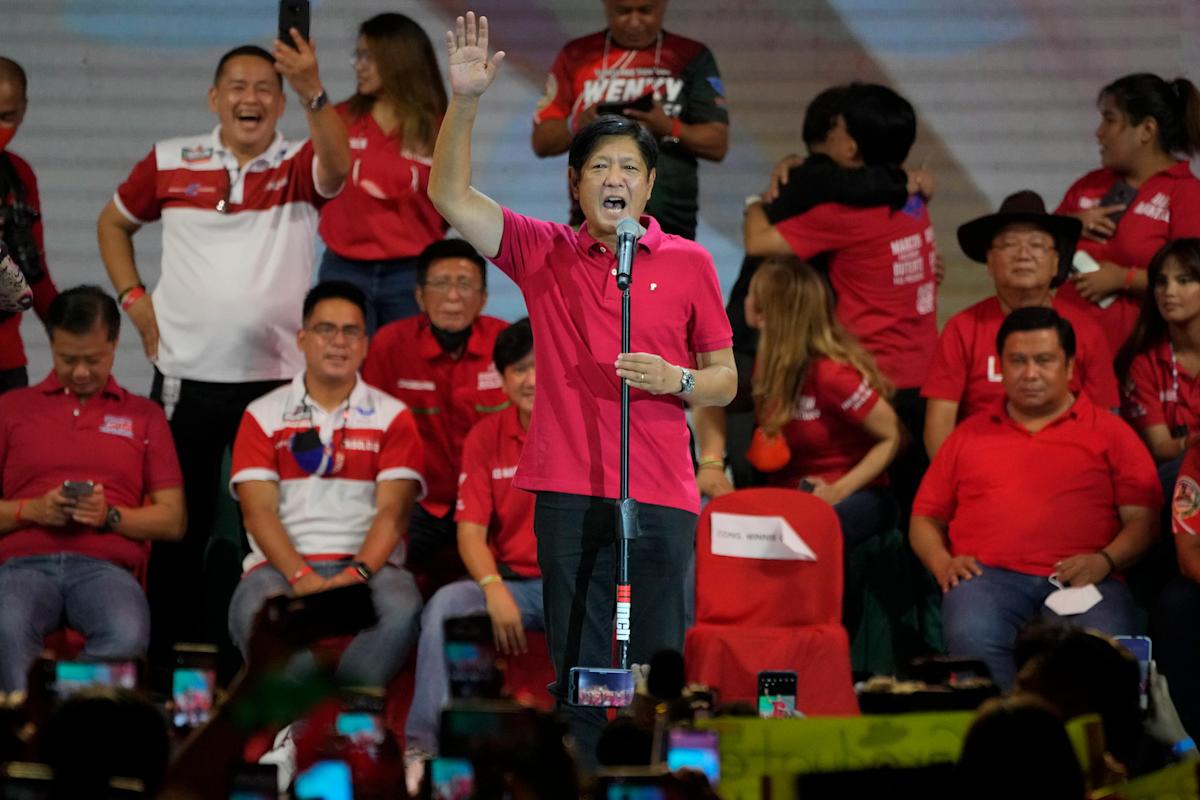MANILA, Philippines (AP) — More than three decades after a largely peaceful “People Power” uprising toppled Philippine dictator Ferdinand Marcos, his son and namesake is the number one choice in most voter preference surveys. Some of the key issues in Monday’s vote:
WHAT’S AT GAME
A triumph of Ferdinand Marcos Jr. would be a stunning reversal from the pro-democracy uprising of 1986 that kicked his father from office to worldwide disgrace. Many Filipinos aware of the human rights atrocities and looting that took place under the older Marcos dictatorship would likely oppose any perceived threat to democracy or attempt by Marcos Jr. to recover assets seized from his family as ill-gotten wealth.
The election winner inherits huge problems, including an economy ravaged by the coronavirus pandemic, deeper poverty and unemployment, hyperinflation caused by skyrocketing oil and gas prices, decades-old uprisings and inflamed political divisions. He or she may also face calls to prosecute outgoing President Rodrigo Duterte for his bloody crackdown on illegal drugs. The International Criminal Court has investigated the murder of thousands of mostly poor petty drug suspects as a possible crime against humanity.
†
FERDINAND MARCOS JR.
A former provincial governor, congressman and senator, the 64-year-old son of the late dictator makes the most impressive attempt yet by the Marcos family to retake the presidency. His mother, Imelda Marcos, tried unsuccessfully to retake the seat of power twice after returning with her children to the Philippines from exile in the United States, where her husband died in 1989.
Marcos Jr. has defended his father’s legacy and steadfastly refuses to apologize and acknowledge the atrocities and looting during the dictatorship. Married to a lawyer, with whom he has three sons, he has steered clear of controversy, including a previous tax conviction and the Marcos family’s refusal to pay a huge estate tax. Throughout his campaign, he clung tenaciously to a rallying cry of national unity. He denies allegations that he funded a years-long social media campaign that used online trolls to smear opponents and whitewash the checkered history of the Marcos family, challenging critics to “show me one.”
†
LENI ROBREDO
An economics student at the University of the Philippines in the 1980s, Leni Robredo joined the mass protests that led to the ouster of the elder Marcos. The 57-year-old also became a lawyer, winning a seat in the House of Representatives in 2013 during her first foray into politics after her husband, a respected politician, was killed in a plane crash in 2012. She defeated Marcos Jr. in the 2016 vice presidential race by a narrow margin in their first electoral showdown. Her advocacy efforts focus on defending human rights and empowering the poor, in part by teaching them their legal rights.
Robredo, the daughter of a court judge, is not one of the prominent families that have dominated Philippine politics for generations, and works as an independent supported by a network of campaign volunteers. As opposition vice president, elected separately from Duterte, she condemned the killings of mostly poor drug suspects as part of his crackdown, which angered the brash leader and strained their ties for years. The mother of three has been cited for her integrity and a lifestyle that eschews the trappings of power — she regularly traveled alone by bus to her home province as a congressman.
†
OTHER CONTENDERS
Eight other presidential candidates have fallen far behind in pre-election polls, including Manny Pacquiao, the 43-year-old former boxer, who vowed to build homes for the poor and imprison corrupt politicians in a “mega prison.” Manila Mayor Isko Moreno, a 47-year-old former TV heartthrob, counted on his life story and public awe for his massive cleanup of the capital. sen. Panfilo Lacson, a 73-year-old former national police chief, has pledged to continue to use his investigative skills to expose major corruption in government.
†
PROTECT THE VOICE
Aside from the presidency, more than 18,000 government posts will be contested in the elections, including half of the 24-member Senate, more than 300 seats in the House of Representatives, as well as state and local offices across the archipelago of more than 109 million Filipinos . About 67 million are registered to cast their vote. The vote will take place on Monday at 1 p.m., the one-hour extension intended to compensate for slower queues due to social distancing and other measures against the coronavirus. After the voting centers close, thousands of counting machines across the country will send unofficial results for counting. A partial, unofficial count could reveal a clear winner in hours, but a close race could last longer. The official Congressional census and recruiting could take weeks.
Thousands of police and military personnel have been deployed because of the long-standing risks posed by communist and Islamist rebels and a history of often bloody family and political rivalries in the countryside. In 2009, gunmen deployed by the family of the then governor of the southern province of Maguindanao massacred 58 people, including 32 journalists, in an attack on an election convoy that shocked the world.

